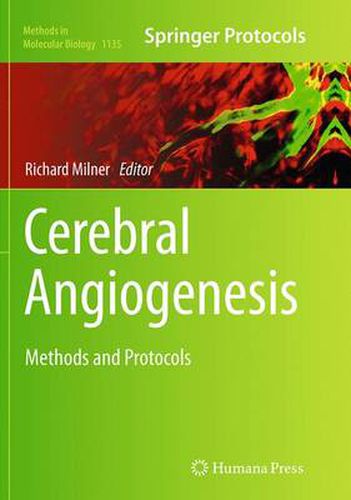Readings Newsletter
Become a Readings Member to make your shopping experience even easier.
Sign in or sign up for free!
You’re not far away from qualifying for FREE standard shipping within Australia
You’ve qualified for FREE standard shipping within Australia
The cart is loading…






Providing a selection of the key techniques that are used in characterizing cerebral angiogenesis, Cerebral Angiogenesis: Methods and Protocols aims to define the cellular and molecular mechanisms underlying this important process. Divided into six parts, this detailed volume examines cerebral angiogenesis occurring in different scenarios, a variety of different models in which cerebral angiogenesis can be studied, methods to characterize and quantify angiogenic events as well as several different approaches to measure changes in cerebral blood flow, different approaches to investigate the role of specific candidate genes in cerebral angiogenesis, methods of therapeutically manipulating cerebral angiogenesis by gene delivery, and finally important approaches to examine cerebral angiogenic mechanisms in vitro. Written in the highly successful Methods in Molecular Biology series format, chapters include introductions to their specific topics, lists of the necessary materials and reagents, step-by-step, readily reproducible laboratory protocols, and tips on troubleshooting and avoiding known pitfalls.
Comprehensive and decidedly practical, Cerebral Angiogenesis: Methods and Protocols should be a vital resource for all researchers, both those new to this field as well as those looking to use more specialized and sophisticated techniques to examine blood vessel growth in the brain.
$9.00 standard shipping within Australia
FREE standard shipping within Australia for orders over $100.00
Express & International shipping calculated at checkout
Providing a selection of the key techniques that are used in characterizing cerebral angiogenesis, Cerebral Angiogenesis: Methods and Protocols aims to define the cellular and molecular mechanisms underlying this important process. Divided into six parts, this detailed volume examines cerebral angiogenesis occurring in different scenarios, a variety of different models in which cerebral angiogenesis can be studied, methods to characterize and quantify angiogenic events as well as several different approaches to measure changes in cerebral blood flow, different approaches to investigate the role of specific candidate genes in cerebral angiogenesis, methods of therapeutically manipulating cerebral angiogenesis by gene delivery, and finally important approaches to examine cerebral angiogenic mechanisms in vitro. Written in the highly successful Methods in Molecular Biology series format, chapters include introductions to their specific topics, lists of the necessary materials and reagents, step-by-step, readily reproducible laboratory protocols, and tips on troubleshooting and avoiding known pitfalls.
Comprehensive and decidedly practical, Cerebral Angiogenesis: Methods and Protocols should be a vital resource for all researchers, both those new to this field as well as those looking to use more specialized and sophisticated techniques to examine blood vessel growth in the brain.